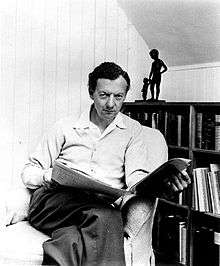The Burning Fiery Furnace
| The Burning Fiery Furnace | |
|---|---|
| Opera by Benjamin Britten | |
 The composer in 1968 | |
| Description | A Parable for Church Performance |
| Librettist | William Plomer |
| Premiere |
9 June 1966 Church of St Bartholomew, Orford, Suffolk |
The Burning Fiery Furnace is one of the three Parables for Church Performances composed by Benjamin Britten, dating from 1966, and is his Opus 77. The other two church parables are Curlew River (1964) and The Prodigal Son (1968). William Plomer was the librettist.
The work was premiered at the Church of St Bartholomew, Orford, Suffolk, England, on 9 June 1966 by the English Opera Group.[1] Set designs were by Annena Stubbs. Colin Graham was the stage director of this first production.[2] The United States premiere was presented at the Caramoor Summer Music Festival on June 25, 1967 with Andrea Velis as Nebuchadnezzar.[3]
The scale and manner of instrumentation are similar to those in Curlew River, but one notable difference is the use of the alto trombone.[4]
Clifford Hindley has commented on a reading of a subtext sympathetic to homosexuality on the part of both Britten and Plomer in their treatment of the story.[5]
Roles
| Role | Voice type | Premiere Cast, 9 June 1966 (Conductor: Benjamin Britten) |
|---|---|---|
| Nebuchadnezzar | tenor | Peter Pears |
| Astrologer | baritone | Bryan Drake[6][7] |
| Ananias (Shadrack) | baritone | John Shirley-Quirk |
| Misael (Meshach) | tenor | Robert Tear |
| Azarias (Abednego) | baritone | Victor Godfrey |
| Herald and Leader of the Courtiers | baritone | Peter Leeming |
| Chorus of Courtiers; attendants | ||
Synopsis
The Burning Fiery Furnace tells the story of Nebuchadnezzar (the historical Nebuchadnezzar II) and the three Israelites, Ananias, Misael and Asarias (corresponding Babylonian names: Shadrach, Meshach and Abednego), who were thrown into a furnace for their refusal to worship Nebuchadnezzar's image of gold. However, God saves them from death, as the voice of an angel joins the Israelites in a 'Benedicite'.
Recording
Britten himself, along with Viola Tunnard, supervised the first commercial recording of this work, for Decca/London, with the following participants:
- Nebuchadnezzar: Peter Pears
- The Astrologer: Bryan Drake
- Ananias (Shadrach): John Shirley-Quirk
- Misael (Meshach): Robert Tear
- Asarias (Abednego): Stafford Dean
- The Herald: Peter Leeming
- Chorus of Courtiers: Graham Allum, Peter Bedford, Carl Duggan, David Hartley, John McKenzie, Clive Molloy, Malcolm Rivers
- The Acolytes: Robert Alder, Paull Boucher, James Newby, Stephen Price, Christopher Taylor
The instrumentalists were Richard Adeney (flute), Neill Sanders (horn), Roger Brenner (trombone), Cecil Aronowitz (viola), Keith Marjoram (double bass), Osian Ellis (harp), James Blades (percussion) and Philip Ledger (organ).[8]
Source: Recordings of The Burning Fiery Furnace on operadis-opera-discography.org.uk
References
Notes
- ↑ John Warrack, "First Performances: Britten's The Burning Fiery Furnace. Tempo, No. 78, pp. 22-23 (1966).
- ↑ Alan Blyth, Obituary for Colin Graham. The Guardian, 10 April 2007.
- ↑ Allen Hughes (June 26, 1967). "Britten Parable Makes U.S. Debut; 'Fiery Furnace,' 2d Church Work, Given at Caramoor". p. 39.
- ↑ Thomas, Christopher J. (1986). "The Church Parables". The Opera Quarterly. 4 (3): 178–184. doi:10.1093/oq/4.3.178. Retrieved 2008-05-01.
- ↑ Clifford Hindley, "Homosexual Self-Affirmation and Self-Oppression in Two Britten Operas". The Musical Quarterly, 76(2), pp. 143-168 (Summer 1992).
- ↑ Elizabeth Forbes, Obituary for Bryan Drake. The Independent, 2 January 2002
- ↑ Keith Grant, Obituary for Bryan Drake. The Guardian, 9 April 2002.
- ↑ Gramophone Archive
Sources
- Holden, Amanda (Ed.), The New Penguin Opera Guide, New York: Penguin Putnam, 2001. ISBN 0-14-029312-4
- Warrack, John and West, Ewan, The Oxford Dictionary of Opera New York: OUP: 1992 ISBN 0-19-869164-5